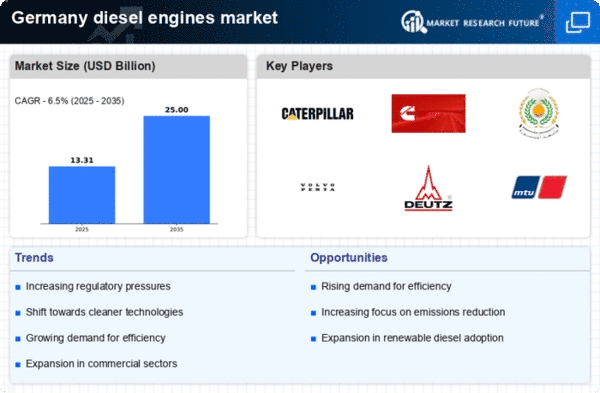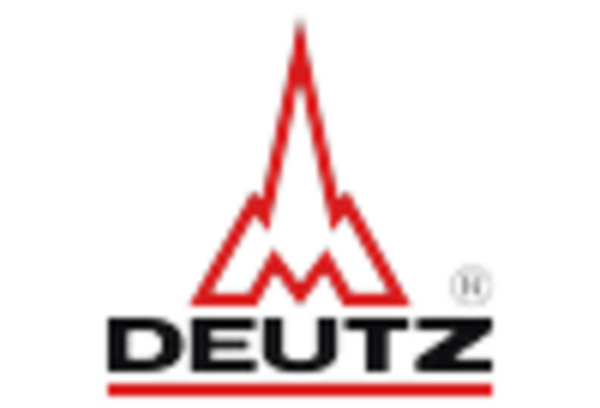Rising Demand for Heavy-Duty Vehicles
the diesel engines market experiences a notable surge in demand for heavy-duty vehicles, particularly in the logistics and transportation sectors. This trend is driven by the increasing need for efficient freight transport, as the country serves as a central hub in Europe. In 2025, the heavy-duty vehicle segment is projected to account for approximately 60% of the total diesel engines market. The robust performance of these vehicles, coupled with their ability to handle substantial loads, positions them as a preferred choice for businesses aiming to optimize operational efficiency. Furthermore, the diesel engines market benefits from the ongoing expansion of infrastructure projects, which further fuels the demand for heavy-duty vehicles.
Export Opportunities in Emerging Markets
the diesel engines market is poised to capitalize on export opportunities in emerging markets. As countries in Asia and Africa continue to develop their infrastructure, the demand for reliable and efficient diesel engines is expected to rise. In 2025, exports of diesel engines from Germany are projected to increase by 15%, driven by the growing need for heavy-duty vehicles and machinery in these regions. This trend presents a lucrative avenue for German manufacturers, allowing them to leverage their technological expertise and reputation for quality. By expanding their reach into emerging markets, the diesel engines market can potentially enhance its growth trajectory and market share.
Investment in Infrastructure Development
Germany's commitment to infrastructure development significantly influences the diesel engines market. The government has allocated substantial funds for upgrading transportation networks, including roads and railways, which directly impacts the demand for diesel-powered machinery and vehicles. In 2025, infrastructure investments are expected to reach €50 billion, creating a favorable environment for the diesel engines market. This investment not only enhances the efficiency of logistics and transportation but also stimulates the need for construction equipment powered by diesel engines. As infrastructure projects progress, the diesel engines market is likely to see sustained growth, driven by the increasing utilization of diesel-powered vehicles and machinery.
Technological Integration in Fleet Management
The integration of advanced technologies in fleet management systems is transforming the diesel engines market. Companies are increasingly adopting telematics and data analytics to optimize fleet operations, leading to improved fuel efficiency and reduced operational costs. In 2025, it is estimated that 40% of diesel-powered fleets will utilize these technologies, enhancing the overall performance of diesel engines. This trend not only supports the operational efficiency of businesses but also contributes to the sustainability goals by minimizing fuel consumption. As the demand for smarter fleet management solutions grows, the diesel engines market is likely to benefit from the increased adoption of technology-driven approaches.
Focus on Fuel Efficiency and Emission Standards
the diesel engines market is increasingly shaped by stringent fuel efficiency and emission standards. The government has implemented regulations aimed at reducing greenhouse gas emissions, which has prompted manufacturers to innovate and enhance the efficiency of diesel engines. In 2025, it is anticipated that around 70% of new diesel engines will comply with the latest Euro 6d emission standards. This focus on sustainability not only aligns with environmental goals but also positions the diesel engines market as a competitive player in the automotive sector. Manufacturers are investing in research and development to create cleaner and more efficient engines, which could potentially lead to a resurgence in diesel engine popularity.
















